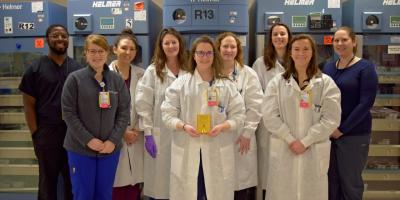Celebrating UVA Sustainability on Earth Day 2023
UVA Sustainability is proud to announce that the University of Virginia has been recognized with three top awards for myriad programs aimed at reducing waste and energy use on Grounds.
The University has a goal of becoming carbon neutral by 2030 and fossil fuel free by 2050. UVA Sustainability has adopted a broad framework to achieve these goals through stewarding resources on Grounds, engaging people at UVA and surrounding communities in environmental topics, especially with a focus on equity, and discovering sustainability solutions through academia and research. (See the 2030 Sustainability Plan)
Virginia Governor’s Environmental Excellence Awards
In March, several staffers with the UVA Office for Sustainability were on hand to accept two awards at a ceremony at the annual Environment Virginia conference in Lexington. UVA won Silver in the “Greening of the Government” category for efforts to reduce waste on Grounds.
“The University of Virginia’s sustainability programs exemplify how Virginia can lead by example to reduce environmental impacts and protect Virginia’s natural resources. This is especially evident in how UVA has implemented Executive Order 17, Recognizing the Value of Recycling and Waste Reduction,” according to the state’s event program.
With hundreds of buildings located across 3,200 acres, the University is taking a dual approach to waste minimization practices. Through both infrastructure improvements and behavior change efforts, UVA is working towards an ambitious goal of reducing waste generated by 70% by 2030, compared to 2010 levels.
During Fall 2022, UVA implemented three pilot programs with the hope of establishing a permanent presence if successful. The pilots prioritized increasing the number of and access to compost and recycling bins, heightening education about sorting waste practices, and identifying major diversion opportunities. The pilots included placing six Zero Waste stations at the McIntire Amphitheater, expanding the “Green Game” to all six home football games, creating a Zero Waste Request Form for students, faculty and staff to request recycling and compost bins for their events, and supplying compostable dining wares for small-scale events.
The second Governor’s award was a Bronze for UVA’s Sustainable Labs program. Labs account for 13% of space on the UVA campus while being responsible for 33% of its total energy consumption – so reducing the energy intensity of labs is essential to meet UVA’s energy goals.
However, labs are sometimes high-risk spaces that are hard to access and even harder to understand occupants’ needs. UVA’s Sustainable Labs program is uniquely designed to leverage every opportunity for energy savings found in labs, with the added benefits of enhanced safety features and strong engagement with research faculty, students and staff.
UVA has fully implemented Sustainable Labs in two research buildings to date, carrying out targeted controls upgrades, installing LED lighting where applicable, and ventilation risk assessments resulting in safe reduction of air exchanges. The team has designed and implemented specialized outreach programs, such as the Green Labs Certification, Shut the Sash for chemical fume hoods, and the International Laboratory Freezer Challenge for cold storage. These measures resulted a 23% decrease in carbon dioxide equivalent emissions and $635,000 savings since November 2021.
National recognition from the U.S. Department of Energy
UVA’s Sustainable Labs Program received a “Better Buildings, Better Practices” 2023 award from the DOE. The department recognized the program’s success in, among other things, decreasing carbon dioxide emissions by more than 20% in energy-intensive lab buildings.
The program not only promotes the efficient use of resources such as energy and water, but also contributes significantly to the efficient use of research space, grant dollars, equipment and more. By emphasizing accessibility, conscientious purchasing practices, efficient waste minimization practices, inventorying best practices, shared equipment and core facilities, Sustainable Labs has a significant economic impact. Once fully implement, the program has calculated a projected savings of $5 million per year.
Moreover, it emphasizes the safety of researchers and contributes to the prevention of accidents and other research-related risks.
This program is unique in that it brings together highly technical elements of building efficiency programming such as retro-comissioning and lab ventilation risk assessments with a thorough outreach, engagement and communications efforts. It addresses sustainability in lab buildings from top to bottom, drawing on the expertise of numerous stakeholders to find sustainability solutions that benefit the research work, the community and the planet.

